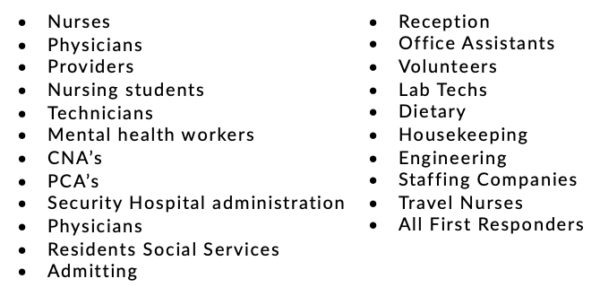
Phoenix Hand Towels
December 13, 2023
Offenderator Visits the ER
May 24, 2024Healthcare VIP Response™ General Certification Training
$60.00
This state mandated training is designed for healthcare workers, travel nursing, and staffing companies in order to qualify for a healthcare position. Qualifies for M.A.B. (Also referred to as AB-508 or SB-1299)
This 100% on-line course is timed & paced to achieve the necessary credits & requirements needed to comply with all State & Federal requirements.
This course is designed for healthcare workers not always regulated by hospitals or organizations to attend workplace violence prevention training. These individuals may include those from healthcare staffing companies, travel nursing, security officers, theft protection agents, home healthcare, doctors and drivers.
This also includes those working within low acuity departments that have limited client contact (referred to state laws AB-508 or SB-1299) requiring certification to qualify for a healthcare position.
This comprehensive Workplace Violence Prevention Training Program is compliant with all California State SB-1299, AB-508, California Health & Safety Codes; 1257.7 and 1257.8, OSHA 8 CCR 3342 as well as all other State and Federal laws to meet the requirements for a mandatory or recommended workplace violence prevention and management program for healthcare. Derivative of the MAB (Management of Assaultive behavior) family, this course also meets all National MAB Standards and Practices.
This class fulfills educational requirements for all clinical & non-clinical hospital employees, emergency personnel and general staff, having direct and non-direct contact with clients within the facility, who have not had previous Violence Prevention Training and are required to attend in order to acquire regulatory compliancy.
Those who wish to learn more about human behavior, both ours and the aggressor, or desire to strengthen their ability to effectively respond to difficult people can also benefit from this class. Participants will learn to react to potentially violent situations, defend themselves against physical attack and feel safer and more confident within their surroundings while encountering aggressive behavior.
This class is appropriate for all healthcare workers.

This includes all on-staff support personnel serving patients & staff directly or indirectly that would benefit from the program. Also appropriate for non-medical, general workplace employees & management who wish to learn how to identify and respond to potential workplace violence.
This training is required for employees who have direct personal contact with clients or anyone within a behavioral health setting. This includes emergency departments where the potential for aggressive or violent behavior exists. Consult your facility’s requirements before registering.
Class Objectives:
- The meaning & definition of “assault” and how it applies to the workplace.
- Types of assaultive behaviors and their causes.
- The importance of assessing what employees bring to a situation that may propel it in a good or bad direction and strategies to avoid making a situation worse.
- Characteristics of victims and aggressive & violent clients.
- The importance of customer service techniques that help clients stay calm.
- General safety measures.
- Personal safety measures.
- The Assault (Crisis) Cycle and how it can de-escalate an aggressive situation.
- The linear steps of negotiation in order to reduce aggression.
- Utilizing the B.E.N.D. Model Algorithm Tree to better understand how to assess a situation in order to direct into in a better, safer and calmer outcome.
- Methods that lay the groundwork for successful de-escalation outcomes.
- Recognizing words & phrases; trigger words to avoid in order to de-escalate individuals.
- Aggression & violent behavior predicting factors.
- Obtaining client history from an individual with past or present violent behavior.
- Verbal intervention & de-escalation techniques along with safe physical maneuvers to defuse and predict violent behaviors.
- Strategies to avoid physical harm and remove yourself from assaultive situations.
- Appropriate and inappropriate use of medications as chemical restraints to help provide coping mechanisms in accordance with Title 22.
- Legal criteria necessary for employees to have the right to place hands on an individual with the intention of restraining or protecting a client.
- Appropriate and inappropriate use of restraining techniques in accordance with Title 22. The use of physical and chemical restraints in health care facilities regulated by both State & Federal Governments.
- Debriefing clients following an aggressive outburst in order to understand root causes of the incident and how employees can help prevent aggression from occurring again.
- Discuss resources available to employees for coping with incidents of violence, including, by way of example, critical incident stress debriefing or employee assistance programs.





